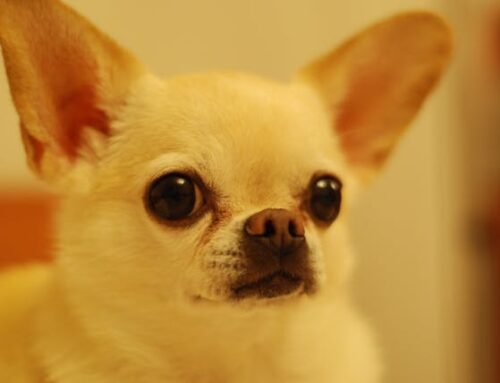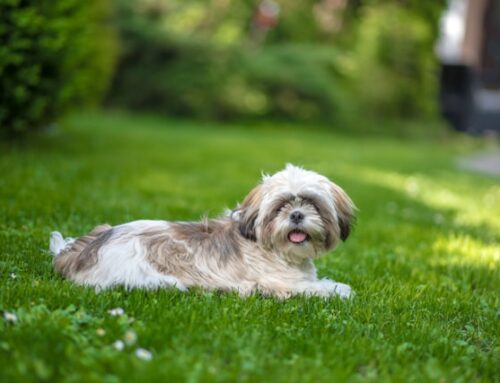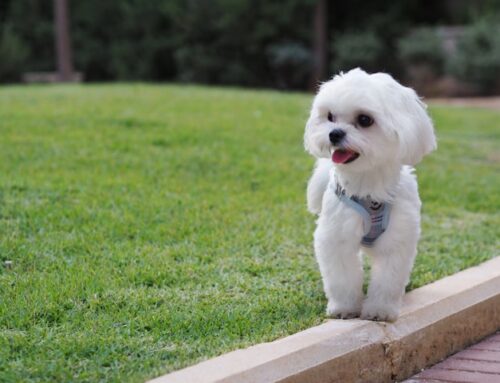Overview
Introduction: Full Grown Morkie

In this introduction to full grown Morkie, we delve into the fascinating world of designer dogs, focusing on the unique blend of Yorkshire Terrier and Maltese that characterizes Morkies.
As beloved companions to many pet parents, Morkie puppies are cherished for their small size, playful demeanor, and affectionate nature. These toy breeds inherit distinctive traits from both Yorkshire Terriers and Maltese, making them a delightful addition to any household.
Throughout this article, we aim to provide valuable insights into the world of Morkie dogs, highlighting their characteristics, care needs, and why they have become such popular choices among small dog enthusiasts.
Purpose of the Article
In this article about full grown Morkie, we aim to provide valuable insights into the unique characteristics of these mixed breed dogs, which are a cross between Maltese and Yorkshire Terrier parent breeds.
Pet parents considering adopting Morkie puppies will find this information helpful in understanding the traits and needs of their future companions. By delving into the backgrounds of the parent breeds, readers can gain a deeper appreciation for how Morkies inherit specific traits from both purebred dogs.
Additionally, we explore why Morkies are classified as toy breeds, highlighting their small size and playful nature. Despite their tiny stature, Morkies are often confident and can hold their own with larger breeds, making them a charming addition to any family.

Understanding Full Grown Morkie
Morkie Breed Origins
The Morkie breed originated in the United States, likely around the late 20th or early 21st century, through the intentional crossing of Maltese and Yorkshire Terrier parent breeds. This hybridization aimed to create a small, affectionate companion dog, which would inherit desirable traits from both breeds.
Morkie puppies are known for their small size, making them ideal for pet parents looking for a compact canine companion. While the American Kennel Club does not recognize the Morkie as a breed, these dogs have gained popularity among small dog enthusiasts for their charming personalities and adaptability to various living environments.
Unlike purebred Maltese or Yorkshire Terriers, Morkies often exhibit a blend of characteristics from both parent breeds, making them unique and beloved pets for many families. The Yorkshire Terrier, originally bred in northern England, and the Maltese, known for their history as rodent hunters, contribute to the Morkie’s distinctive traits and appeal.
The Morkie’s small size, fluffy coat, and endearing features often lead to them being affectionately referred to as “teddy bear” dogs. A Full Grown Morkie retains these charming qualities, making them delightful companions for individuals and families alike.

Morkie Characteristics
Size
Morkies are small dogs, typically weighing between 4 to 8 pounds and standing about 6 to 10 inches tall at the shoulder. As a mixed breed or designer breed, Morkies inherit their size from their parent breeds, the Maltese and Yorkshire Terrier.
Their small size makes them suitable for apartment living and traveling, and they are often considered a toy or small dog breed. Despite their tiny size, Full Grown Morkie can be energetic and enjoy participating in dog sports or activities suitable for small dogs.
Their size and mixed-breed status contribute to their appeal as a designer dog breed, prized for their adorable appearance and lively personality.
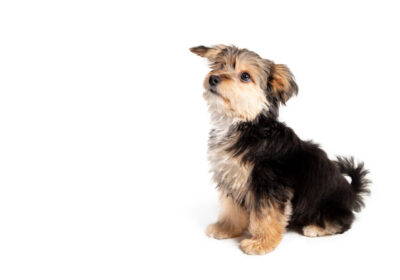
Coat
Morkies, a popular crossbreed among small dog breeds, inherit their coat characteristics from their Maltese parent. Known for their fluffy, silky fur, Morkie puppies often have a coat that is soft to the touch and comes in a variety of colors, including black, white, and tan.
One of the appealing traits of the Morkie’s coat is its low shedding, making them a great choice for individuals with allergies or those who prefer a cleaner home. Regular grooming is essential to maintain the dog’s coat health and appearance, including brushing to prevent matting and occasional trims to keep the fur neat and tidy.
Morkie Personality and Temperament
Morkies, also known as a Morkshire Terrier, are cherished for their delightful temperament, which they inherit from their Yorkshire Terrier parent. Despite their tiny size, a full grown Morkie possess a spunky and affectionate personality, often displaying confidence and a playful nature.
They are known for forming strong bonds with their owners and are typically friendly towards strangers and other animals. While they may have the energy of a larger dog, full grown Morkie dogs are well-suited for apartment living due to their small size. Their adaptability and loving nature make them wonderful companions for individuals and families alike.

Health Considerations
Morkies, also known as Morkshire Terrier, are generally healthy dogs, but like all breeds, they are prone to certain health issues. Due to their small size, full grown Morkie dogs can be more susceptible to problems related to their weight, so it’s important to monitor their diet and exercise to maintain a healthy weight.
Another common health issue in full grown Morkie dogs is periodontal disease, which can be prevented with regular dental care. Despite these concerns, with proper care and regular check-ups, full grown Morkie dogs can live long and healthy lives as beloved companions.
Growth Stages of Morkies
Morkie Puppy

Morkie puppies, a delightful mix of Yorkshire Terrier and Maltese, undergo fascinating growth stages that reflect their unique heritage. As tiny dogs, Morkie puppies inherit their petite size from their Maltese and Yorkie parent breeds, making them perfect for apartment living or as companions for those with limited space.
During their early age, Morkie puppies experience rapid growth, both physically and developmentally. It’s crucial to provide them with the proper care and nutrition tailored to their small size and specific needs. Understanding the growth stages of Morkie puppies is essential for ensuring they develop into healthy, happy adult dogs, cherished members of their families.

Full Grown Morkie
During adulthood, Full Grown Morkie dogs require a balanced dog food diet to maintain their health and weight. As they age, their dietary needs may change, so it’s essential to adjust their food accordingly. Monitoring a Full Grown Morkie’s weight is crucial to prevent obesity, which can lead to health issues.
Adult Full Grown Morkie dogs typically reach their full size and weight by one year of age, but their diet should still be carefully managed to ensure they remain healthy and active. Consulting with a veterinarian can help determine the best diet plan for a Full Grown Morkie based on their age, weight, and overall health
Feeding and Nutrition for Full Grown Morkie
Recommended Dog’s Diet
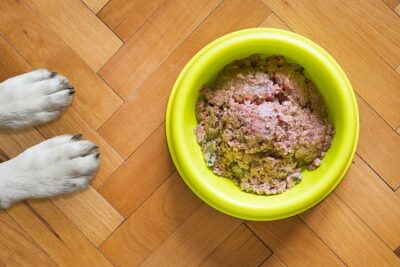
Feeding a full-grown Morkie requires careful consideration to ensure they receive the proper nutrition for their size and breed. While Morkies are small dogs, their dietary needs can differ from other dogs, so it’s essential to choose a high-quality dog food specifically formulated for small breeds.
These foods are designed to provide the right balance of nutrients to support the health and weight of a Morkie. Monitoring a Morkie’s weight is important, as overfeeding can lead to obesity, which can be harmful to their health.
Additionally, supplementing their diet with omega-3 fatty acids from fish oil can be beneficial for their skin, coat, and overall health. It’s also a good idea to consult with a veterinarian to determine the best diet plan for a full-grown Morkie, taking into account their age, weight, and overall health.

Nutritional Needs
Meeting the nutritional needs of a full-grown Morkie is essential for maintaining their health and well-being. While they may be small in size, Morkies have unique dietary requirements that differ from other dogs.
It’s crucial to choose a high-quality dog food specifically formulated for small breeds, as these foods are designed to provide the right balance of nutrients for a Morkie’s size and activity level. Monitoring their weight is also important, as overfeeding can lead to obesity, which can increase the risk of health issues.
Consulting with a veterinarian can help determine the best diet plan for a full-grown Morkie, ensuring they receive the proper nutrition to thrive.
Avoiding Overfeeding
Preventing overfeeding is crucial when considering the diet of a full-grown Morkie. While it may be tempting to indulge them, maintaining a balanced and appropriate diet is key to their health. Overfeeding can lead to weight gain, which can strain their tiny frames and lead to health issues.
Monitoring the dog’s weight and adjusting their diet accordingly can help prevent overfeeding. Consulting with a veterinarian to establish a suitable feeding routine and portion size based on their weight and activity level can ensure they maintain a healthy weight and live a long, happy life.
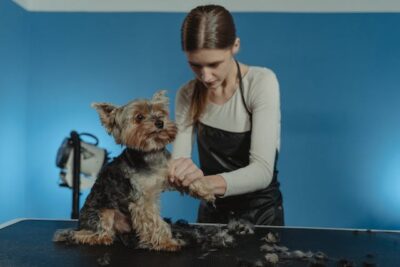
Grooming and Care Tips
Coat Maintenance
Morkies, known for their low shedding coats, require regular grooming to keep their fur in top condition. Despite their small size, Morkie puppies can have long, flowing coats that need to be brushed daily to prevent matting and tangling.
Regular grooming not only keeps their coat looking healthy but also helps distribute natural oils, keeping their skin moisturized. Using a detangling spray can make brushing easier and more comfortable for Morkie dogs.
Additionally, occasional trims may be necessary to maintain a manageable length, especially around the eyes and paws. Grooming is not only essential for the physical health of Morkies but also provides a bonding opportunity between the dog and its owner.
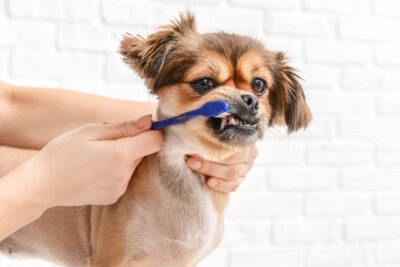
Dental Care
Periodontal disease is a common issue in small breeds like Morkies, making dental care an essential part of their grooming routine. Regularly brushing a Morkie’s teeth with a dog-friendly toothbrush and toothpaste can help prevent the buildup of plaque and tartar, which are leading causes of periodontal disease.
Additionally, providing dental chews or toys designed to promote dental health can help keep their teeth clean and healthy. Routine dental check-ups with a veterinarian are also recommended to monitor their oral health and address any issues early. By prioritizing dental care, owners can help ensure their Morkie maintains a healthy smile and overall well-being.
Regular Vet Check-ups
Due to their small size, Morkies are prone to certain health issues, making regular vet check-ups crucial for maintaining their health and well-being. These check-ups are essential for monitoring their overall health, detecting any potential issues early, and ensuring they receive timely vaccinations and preventive treatments.
The vet can also provide guidance on nutrition, grooming, and dental care specific to Morkies. By scheduling regular check-ups, Morkie owners can help ensure their pets lead long, healthy lives free from preventable health issues.

Exercise Requirements
Daily Exercise Needs
Despite their small size, Morkies have a lively personality and require daily exercise to stay healthy and happy. Active play sessions, such as short walks or indoor games, are essential to meet their physical exercise needs.
Without enough exercise, Morkies may exhibit destructive behavior out of boredom or excess energy. It’s important to socialize them early and introduce them to various environments and people to help prevent behavioral issues.
Due to their size, Morkies can easily get enough exercise indoors, but they also benefit from outdoor activities in a safe environment, including visits to dog parks. Regular physical activity not only helps maintain their health but also strengthens the bond between the Morkie and its owner.
Suitable Activities
Given their lively personality, Morkies thrive on a variety of activities to keep them physically and mentally stimulated. Interactive play, such as fetch or hide-and-seek, can help satisfy their need for exercise while engaging their minds.
Short walks in safe areas can also provide valuable outdoor time for Morkies to explore and burn off energy. Indoor games, like obstacle courses or puzzle toys, are great for days when outdoor activity is limited. It’s important to tailor activities to the individual Morkie’s health and energy levels, ensuring they receive the right amount of exercise to stay fit and healthy.
While some Morkies may enjoy trips to the dog park, not all dogs thrive in that environment, so it’s important to gauge your Morkie’s comfort level and behavior around other dog breeds before visiting a dog park.
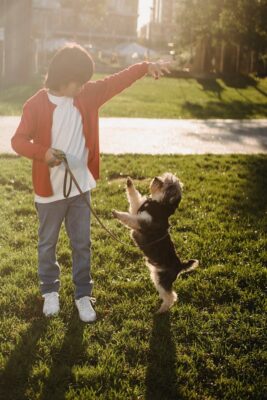
Training Techniques
Positive Reinforcement
Training a Morkie requires patience and consistency, but their eager-to-please personality makes them responsive to positive reinforcement techniques. Using rewards such as treats, praise, and playtime can help motivate them during obedience training sessions.
Morkies respond well to early socialization, which helps them become well-adjusted and confident in various situations. It’s important to keep training sessions short and engaging to prevent boredom, as Morkies can become disinterested quickly.
By focusing on positive reinforcement and early socialization, owners can help their Morkies develop good behavior habits and maintain their overall health and well-being
Housebreaking Tips
Housebreaking a Morkie puppy requires patience and consistency, especially in homes with other pets, older children, or small children. Socializing the Morkie puppy early to the presence of other pets, as well as teaching older children and small children to respect the new pet’s space, can help create a harmonious environment.
When introducing a Morkie puppy to a home with larger dogs, supervision is key to ensure everyone’s safety. Using a consistent schedule for feeding and bathroom breaks, along with positive reinforcement such as treats and praise, can help the Morkie puppy learn where and when to go potty. With time and effort, the Morkie puppy can become a well-trained member of the household.
Dealing with Behavioral Issues
When dealing with behavioral issues in Morkies, it’s essential to consider their unique personality and the presence of other breeds in the household. Introducing a new pet or similar breeds can sometimes trigger behavioral problems, especially in younger Morkies.
Most dogs, including most breeds, may exhibit behavioral issues at some point in their lives, so it’s important to address these issues early on. Training techniques should be tailored to the Morkie’s age and specific behavior, with an emphasis on positive reinforcement.
Consistency is key, and patience is necessary when correcting behavioral issues. Seeking advice from a professional dog trainer or behaviorist can also be beneficial in addressing and resolving behavioral problems in Morkies.

Common Morkie Health Issues in Full Grown Morkie
Genetic Morkie Health Concerns
Full-grown Morkies, being a mix of both the Maltese and Yorkshire Terrier breeds, may inherit genetic health issues from both parent breeds. It’s important to be aware of these potential health concerns and monitor them closely as the dog ages.
Common genetic health issues in Morkies include dental problems, such as tooth decay and gum disease, which can be exacerbated by age. Regular dental check-ups and proper oral care can help prevent these issues.
Additionally, Morkies may be prone to respiratory problems due to their small size and flat faces, so it’s important to keep an eye on their breathing and seek veterinary care if any issues arise. Overall, understanding the potential genetic health concerns of Morkies and providing proper care can help ensure their long-term health and well-being.
Preventative Care
Preventative care plays a crucial role in maintaining the health and well-being of full-grown Morkies. Regular veterinary check-ups are essential to monitor their overall health and detect any potential issues early.
Vaccinations, flea, and tick prevention, as well as heartworm prevention, are important aspects of preventative care for Morkies.
Additionally, maintaining a healthy diet, providing regular exercise, and keeping up with dental care can help prevent common health issues in Morkies. Being proactive about preventative care can help ensure that Morkies lead healthy and happy lives.
Recognizing Symptoms
Recognizing symptoms of common health issues in full-grown Morkies is essential for early intervention and treatment. Watch for signs such as changes in appetite, weight loss or gain, lethargy, coughing, sneezing, or difficulty breathing, as these could indicate underlying health problems.
Skin issues like itching, redness, or hair loss should also be monitored. Additionally, keep an eye out for changes in behavior, such as increased aggression, anxiety, or restlessness, which could be a sign of pain or discomfort.
Regularly checking your Morkie’s ears, eyes, teeth, and gums can help you spot any abnormalities early on. If you notice any of these symptoms, it’s important to consult with a veterinarian for proper diagnosis and treatment.
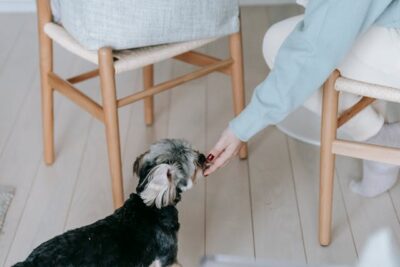
Lifespan and Aging: Full Grown Morkie
Average Lifespan of Morkies
The average lifespan of Morkies, a mix between Maltese and Yorkshire Terrier breeds, is typically between 10 to 15 years. Providing proper care, including regular veterinary check-ups, a balanced diet, regular exercise, and mental stimulation, can help ensure that Morkies live a long and healthy life.
Genetics and overall health can also play a significant role in determining the lifespan of an individual Morkie. By providing a loving and nurturing environment, Morkie owners can help their furry companions live a full and happy life.
Aging Gracefully
As Morkies age, it’s important to help them do so gracefully by providing proper care and attention. Their lifespan, averaging between 10 to 15 years, can vary based on genetics, diet, and overall health.
To ensure they age well, Morkie owners should continue regular veterinary check-ups, maintain a balanced diet suitable for their age and health status, and provide regular exercise and mental stimulation.
As they age, Morkies may require adjustments to their care, such as softer foods for dental health or supplements for joint health. Providing a loving and supportive environment as they age can help Morkies enjoy their golden years to the fullest.

Full Grown Morkie in Different Environments
Urban Living
Full-grown Morkies, a blend of Maltese and Yorkshire Terrier breeds, can adapt well to urban living with proper care and attention to their needs. Their small size and adaptable nature make them suitable for apartment living, provided they receive enough exercise and mental stimulation.
Morkies, known for their lively and affectionate personalities, thrive in environments where they are socialized early and exposed to various stimuli. However, their close bond with their owners can sometimes lead to separation anxiety if left alone for long periods.
To mitigate this, it’s important to gradually acclimate them to being alone and provide toys or puzzles to keep them occupied. With proper training and care, Morkies can flourish in urban settings, becoming beloved companions for city dwellers of all ages.
Suburban or Rural Settings
Full-grown Morkies can thrive in suburban or rural settings, enjoying the space and freedom these environments offer. Their adaptable nature allows them to adjust to different living situations, but they may particularly enjoy the open spaces and fresh air of suburban or rural areas.
Morkies, a mix of Maltese and Yorkshire Terrier breeds, are known for their playful and affectionate personalities, making them great companions for families in these settings. Their small size makes them well-suited for homes with yards, where they can run and play freely.
However, it’s important to ensure they are properly supervised and trained, as they may encounter different wildlife or environmental hazards in these settings. With proper care and attention, Morkies can thrive and bring joy to their owners in suburban or rural environments.

Morkies as Therapy Dogs
Qualities that Make Morkies Good Therapy Dogs
Morkies make excellent therapy dogs due to their small size, friendly demeanor, and adaptability. Their cute appearance and gentle nature help put people at ease, making them approachable companions for therapy work.
Morkies are also intelligent and trainable, allowing them to learn specific tasks or behaviors that can be beneficial in therapeutic settings. Additionally, their loyalty and ability to form strong bonds with people make them effective at providing comfort and companionship to those in need.
Training for Therapy Work
Training a Morkie for therapy work involves several key steps. It’s important to start with basic obedience training to ensure they can follow commands reliably. Socialization is also crucial, exposing them to different people, environments, and situations to help them become comfortable and confident in various settings.
Specific training for therapy work includes teaching them to remain calm and well-behaved in distracting environments, to interact gently with people, and to respond positively to different stimuli. Consistency, patience, and positive reinforcement are key throughout the training process to ensure the Morkie is well-prepared for the demands of therapy work.
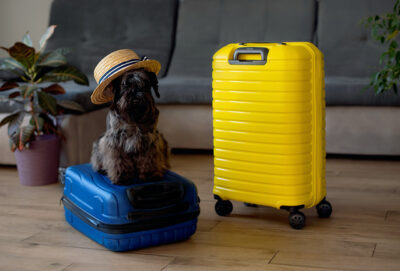
Traveling with Full Grown Morkie
Tips for Safe Travel
Traveling with full-grown Morkies can be enjoyable with proper preparation. Start by ensuring they are comfortable in a travel crate or carrier, and that it’s well-ventilated and secure. Bring along their favorite toys, bedding, and food to keep them comfortable and relaxed.
Plan regular stops for potty breaks and exercise, and never leave them unattended in a vehicle. Ensure they are up-to-date on vaccinations and have identification tags with current contact information. Lastly, consult with your veterinarian for any additional tips specific to your Morkie’s needs for a safe and stress-free journey.
Traveling Essentials
When traveling with full-grown Morkies, it’s important to pack their essentials to ensure their comfort and well-being. Bring along their regular food and treats, as well as a portable water bowl and plenty of fresh water.
Don’t forget their leash, collar with ID tags, and any necessary medications. A travel crate or carrier that is comfortable and secure is also essential for their safety during transit. Lastly, bring along their favorite toys or blanket to provide a sense of familiarity and comfort in new surroundings.

Cost of Owning a Full Grown Morkie
Initial Purchase Price
The cost of owning a full-grown Morkie starts with the initial purchase price, which can vary depending on factors such as the breeder’s reputation, the Morkie’s lineage, and the region. On average, a Morkie puppy can cost anywhere from $500 to $3000 or more.
It’s important to budget for additional expenses such as veterinary care, food, grooming, toys, and supplies. Investing in a quality breeder and ensuring the Morkie’s health and pedigree can help prevent future costly health issues.
Annual Expenses
The cost of owning a full-grown Morkie includes annual expenses such as veterinary care, which can range from $200 to $600 or more depending on the health of the dog and any necessary vaccinations or treatments.
Food costs typically amount to around $200 to $500 annually, depending on the quality and brand of food chosen. Grooming expenses, including regular grooming appointments and grooming supplies, can range from $300 to $600 per year.
Other annual expenses to consider include pet insurance, which can cost around $200 to $600 annually, and toys and accessories, which can vary depending on the owner’s preferences.
Budgeting Tips
When budgeting for the cost of owning a full-grown Morkie, it’s important to consider all potential expenses. Start by estimating the annual costs of veterinary care, food, grooming, pet insurance, and accessories.
Set aside a portion of your budget for unexpected expenses, such as emergency veterinary care or unexpected repairs to your Morkie’s belongings. Consider ways to save money, such as buying pet supplies in bulk or looking for discounts on veterinary services.
Regularly review your budget to ensure you’re staying on track and adjust as necessary to meet your Morkie’s needs while maintaining financial stability.

Conclusion: Full Grown Morkie
In conclusion, full-grown Morkies, with their charming blend of Yorkshire Terrier and Maltese traits, make wonderful companions for individuals and families alike.
Their small size, playful nature, and affectionate demeanor endear them to many, while their adaptability to various living environments makes them suitable for urban, suburban, and rural settings. Understanding the unique characteristics and needs of Morkies, from their grooming requirements to their health considerations, is crucial for providing them with a happy and healthy life.
Whether as therapy dogs providing comfort and companionship or as beloved pets bringing joy to their owners, full-grown Morkies exemplify the best qualities of designer dog breeds, enriching the lives of those around them.
For those interested in adding a Morkie to their family, we offer Morkie puppies for sale in Georgia and surrounding areas. Our puppies are thoughtfully bred from reputable breeders, ensuring they are well-loved, socialized, and healthy. To view available Morkie puppies, please visit our website.
Frequently Asked Questions (FAQs): Full Grown Morkie
- What is a Morkie?
- A Morkie is a mixed breed dog resulting from the crossbreeding of a Maltese and a Yorkshire Terrier. They are known for their small size and affectionate nature, making them popular companions.
- How big do full-grown Morkies get?
- Full-grown Morkies typically weigh between 4 to 8 pounds and stand about 6 to 10 inches tall at the shoulder. They are considered small or toy dogs.
- What is the personality of a Morkie like?
- Morkies are known for their lively and affectionate personalities. They are often described as playful, friendly, and loyal. They can be good with other dogs and pets if socialized early.
- Are Morkies good with other dogs?
- Morkies can get along well with other dogs, especially if they are socialized early. However, as with any breed, individual personalities can vary, so it’s essential to monitor their interactions.
- Do Morkies have the temperament of a terrier or the Maltese?
- Morkies can inherit traits from both the Maltese and Yorkshire Terrier parent breeds. They may exhibit characteristics of both breeds, including the terrier’s spunky nature and the Maltese’s gentle demeanor.
- Are Morkies good with children?
- Morkies can be good with children, especially if they are raised with them and socialized early. However, due to their small size, they may be better suited for families with older, gentle children who know how to handle little dogs.
- Do Morkies bark a lot?
- Morkies can be prone to barking, especially if they are not trained early. Proper training and socialization can help minimize excessive barking behavior.
- Are Morkies easy to train?
- Morkies are intelligent dogs and can be trained with patience and consistency. Positive reinforcement techniques are often effective in training Morkies.
- Do Morkies shed?
- Morkies have a low-shedding coat, similar to their Maltese parent. However, regular grooming is still required to keep their coat healthy and mat-free.
- Are Morkies considered hypoallergenic?
- While no dog breed is entirely hypoallergenic, Morkies are often considered hypoallergenic due to their low-shedding coat. However, individual reactions can vary, so it’s essential to spend time with a Morkie before bringing one home if you have allergies.


